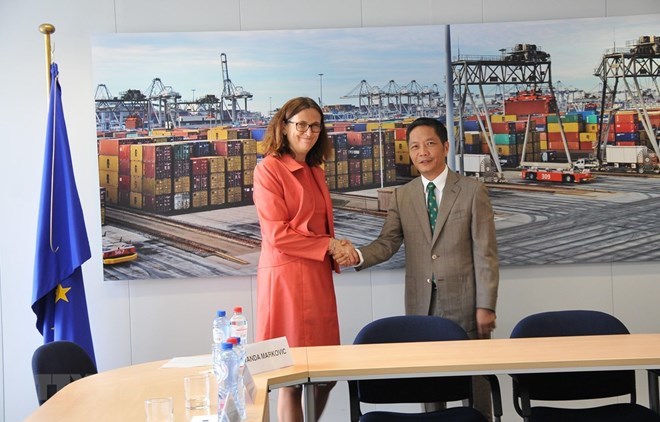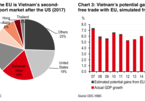 |
|
Minister of Industry and Trade Tran Tuan Anh (R) and European Commissioner for Trade Cecilia Malmström during a meeting in Belgium in 2018
|
The EVFTA and EVIPA are standard and most ambitious agreements concluded between the EU and a developing country.
Once the EVFTA takes effect, over 99 percent of tariff on goods from both sides will be lifted. Vietnam will remove 65 percent of import tariff on goods from the EU. Remaining tariffs will be removed in the next decade.
Besides offering significant economic opportunities, the trade agreement ensures that trade, investment and sustainable development go hand in hand, by setting the highest standards of labour, safety, environmental and consumer protection.
Meanwhile, the EVITA will help enhance the EU’s investment in Vietnam.
Vietnam is the EU’s second largest trade partner in ASEAN with a trade value of nearly 50 billion EUR (about 56 billion USD).
The FTA was initiated in June 2012 and negotiations on the deal concluded in 2015.
After legal review, the EU proposed dividing the FTA into the EVFTA and EVIPA in September 2017.
After being signed, the two deals will be submitted to the European Parliament (EP) for consent.
The EVFTA is expected to be approved by the EP later this year or early 2020.
Meanwhile, it will take at least two years for the EVIPA to be ratified by the EP and member parliaments.
WB highlights benefits, challenges from FTA with EU to Vietnam
The EU – Vietnam Free Trade Agreement (EVTA) to be signed on June 30 in Hanoi will bring both opportunities and challenges to Vietnam, so domestic enterprises should be really prepared to take full advantages of benefits from the deal, said Sebastian Eckardt, lead economist of the World Bank (WB) in Vietnam.
In an interview with the Vietnamese News Agency (VNA), the economist said the EVFTA is an important trade deal after the Comprehensive and Progressive Agreement for Trans-Pacific Partnership (CPTPP) that Vietnam ratified late last year and became effective early this year.
“EVFTA is another big important FTA because of the size of the market,” he said, adding the EU is the second largest export market of Vietnam.
According to the economist, Vietnam and Singapore are two ASEAN economies that have such a deep and comprehensive trade agreement with the EU, and the advantage will offer benefits to Vietnam in such areas as food processing and agriculture.
Regarding Vietnam’s economic situation, Eckardt said coming up exceptionally strong growth in 2018, the WB sees that there are some signs that economic activities have been moderating since the beginning of the year.
There are two main reasons. First, global growth has slowed down that has affected external demand, especially for manufacturing, export-oriented manufacturing, which is a big and glowing part of the Vietnam economy. Second, there are some domestic factors, including the impact of the African swine fever on agriculture production, according to him.
Vietnam’s economic growth remains robust in this year despite some difficulties, he said, adding the WB has not changed the outlooks for this year and expects the growth to be 6.6 percent, down from 7.1 percent.
He highlighted manufacturing as the driver of Vietnam’s economic growth with an average increase of 11 - 12 percent in the last four years.
The sector is driven by the increase in foreign direct investment, thanks to free trade agreements that has signed, according to Eckardt.
He also emphasised the potential of service and agriculture, suggesting Vietnam increase the farm produce value by focusing on processing to create a long-term higher value chain.
VNA

VN textile and garment producers could face problems meeting CPTPP, EVFTA standards
Vietnam’s textile and garment may not be able to take full advantage of the preferential tariffs of two important FTAs, CPTPP and EVFTA, because of problems in input materials.

EU, Vietnam to ratify “ambitious” EVFTA by end of 2019: HSBC
It is estimated that the EU-Vietnam FTA (EVFTA) will add 0.1 percentage point (ppt) on average to Vietnam’s real GDP growth each year based solely on its trade impacts.
 The European Council announced on June 25 that it has approved the EVFTA and the EU – Vietnam Investment Protection Agreement (EVIPA), and assigned the EU to sign the deals with Vietnam on June 30 in Hanoi.
The European Council announced on June 25 that it has approved the EVFTA and the EU – Vietnam Investment Protection Agreement (EVIPA), and assigned the EU to sign the deals with Vietnam on June 30 in Hanoi.